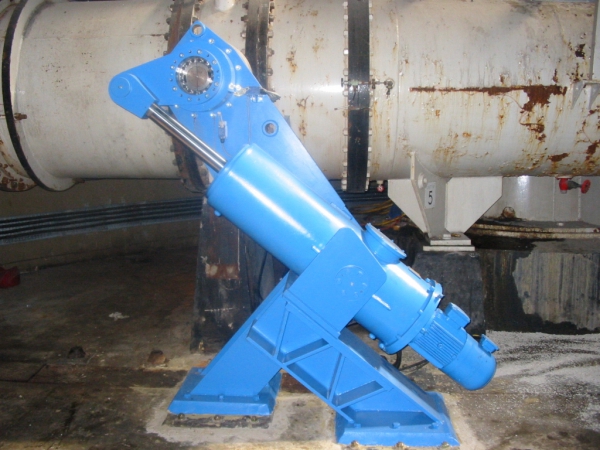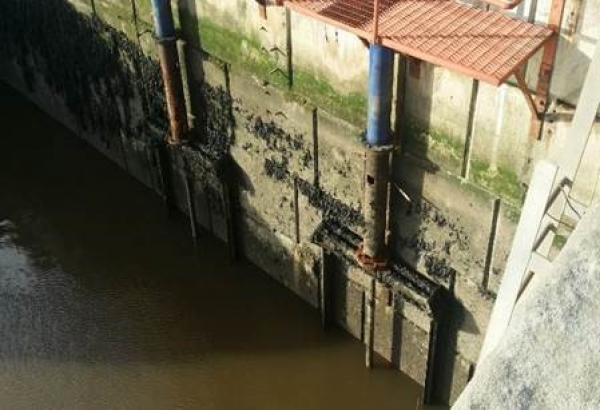Advanced Actuators Ltd: Developing Hydraulic Actuators for a Growing Water Industry



Amid a surge in interest from the water treatment industry, Chris Woodhead, managing director of Advanced Actuators, gives us an insight behind the rising tide of interest for hydraulic actuators as oppose to more traditional electric options:
We have seen a 25% increase in demand for our hydraulic actuators from new and existing customers within the water supply and treatment industries in the last five years and while we have been supplying that sector for four decades, more businesses are now widely catching on to the benefits over traditional alternatives with major players throughout the world.
Line of modulating duty
One of the key benefits of hydraulic actuators is that components are bathed in oil and do not need a mechanical convertor to go from a rotary to a linear function. Mechanical convertors can quickly wear out, posing problems for the modulating duty, particularly in harsh environments or where there is contamination, the actuator must be able to cope with multiple starts without losing any accuracy in its control.
We’ve been supplying our line of linear and rotary electro-hydraulic actuators to the water industry for more than 40 years, with the linear range also having applications in other industries such as oil and gas and power generation. The E-series of our electro-hydraulic actuator range has been developed with both linear and quarter turn options with modulating and isolating duties for the flexibility and versatility to suit most actuation needs with a standard thrust of up to 320,000kg and torque of up to 1,500,000Nm.
They also feature fail fix or fail close/open, adjustable speeds and working pressure up to 250 barg.
Going green
As environmental issues continue to top the business agenda, more and more end users, customers and consumers are concerned with the green credentials of their suppliers and products.
There is also increasing pressure on the market to change the way water, and specifically wastewater, is processed. It is no longer acceptable to dispose of wastewater into rivers and seas and more and more processes and regulations are being put in place all the time to ensure this change in processes.
Therefore, a key benefit of the hydraulic actuators our in-house engineers have been developing is a fully self-contained and sealed unit. This prevents contamination getting in and any oil leaking out. It is also best used with biodegradable oil to pose even less risk to the environment, making it ideal for the water industry as it strives to protect the micro-organisms in our waterways.
We have supplied a number of solar powered actuators which provide a large amount of thrust and torque with comparatively small amounts of power which means less energy used and a much more efficient process.
One of our customers is currently benefiting from a solar powered unit which provides 2500kg of force from just 50 watts, the equivalent of a household lightbulb.
Need for speed
We have found that speed is another major consideration in the choice of actuator and one of the key deciding factors influencing those water industry customers who opt for hydraulic actuators over more traditional options.
Unlike electric actuators, they can reach high linear speeds of more than one meter per second regardless of the torque or thrust levels. This can make a dramatic difference when lifting and lowering of gates in water treatment facilities and prevent the passing of thousands of cubic metres of water while waiting for the closure of gates.
We have continually developed and refined the features of this hydraulic range to provide a more dynamic system with our customers benefitting from opening and closing speeds of 60 metres per minute, as oppose to five metres per minute from standard electric or pneumatic actuators.
Fail to plan, plan to fail
Our customers tend have three general forms of fail mode that need addressing - fail in last position, fail open or fail closed – all of which are best supported with hydraulic actuators. Although with electric actuators it is possible perform with both fail open and fail closed, there are usually factors which limit performance or make the process more difficult than with hydraulics.
With power supplies, batteries or compressed air required with traditional actuators, systems require human input to maintain and reset the system costing time and money for each failure. Hydraulic actuators re-set themselves without human intervention providing a quicker, simpler and safer alternative.
Torque talk
Large amounts of thrust/torque in electric actuators can slow down the speed of operation. With pneumatic actuators, a greater thrust/torque means bigger plant is needed due to the limited amount of air pressure available.
But hydraulic actuators can maintain both high speeds and more thrust/torque. We have developed machines, currently in use in the water industry for our customers, which have a delivered 320,000kg of thrust, possible by both pneumatic or electric counterparts but the size and speed become huge limiting factors. For quarter turn applications we have built actuators with a torque output of 1.5 million Nm for a power station application.
Electrical elements
This combination of large thrust, greater torques, increased speeds, modulating duty and fail safe advantages have proved a winning mix in the multi-billion pound water treatment industry, both here and abroad.
Of course, there will also be a place for electric and pneumatic actuators but we have found that the water industry in particular has caught on to the operational and cost-saving benefits of hydraulic systems brought on by continual technological advances. However, we continue to include some form of electrics, from basic starter panels to more complex modulating controls. Providing a bespoke package is usually the most effective method of providing the best possible solution with thorough testing, after sales care and remote monitoring.
We look forward to continuing to develop a range of actuators which grows and advances as the needs of the vast and ever-important needs of the water treatment industry change.
Advanced Actuators has clients in the oil and gas, bulk handling, power, water and nuclear sectors such as Shell, Petronas, EDF Nuclear Energy, Thames Water, Dubai Municipality and BP, supplying standard and bespoke hydraulic engineering and servicing across the globe, including Europe, India the Middle and Far East.
For more information, visit www.advanced-actuators.com or contact 01535 655151.

| Telephone: | +44 (0)1535 655151 |
| Email: | sales@advanced-actuators.com |
| Website: | www.advanced-actuators.com |
| More information on the Advanced Actuators Limited BVAA Member Directory Page |
Search related valve / actuator articles: Advanced Actuators LimitedIssue 61Hydraulic Actuators







-web.jpg)





